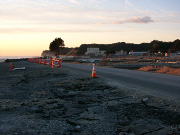
Japan (MNN) — Picture this: A massive undersea earthquake, registering at 9.0 on the Richter scale, triggers a tsunami with 110-foot waves, which strikes just south of Tokyo at midnight. Winter winds help fuel the waves, and most of the disaster's 320,000 victims are swept away while they slumber. The rest are finished off by falling objects or fires sparked by the storm.
This was the image Japan's government depicted in a recent "worst case disaster scenario" report.
"Since March of 2011, they've talked a lot about another quake coming," said Mary Jo Wilson, VP for Japan for Asian Access, "possibly with an epicenter closer to Tokyo, which would have much greater implications for life and loss."
The government's intent for the report was to help officials boost their disaster preparedness, but Wilson noted a different effect on the people of Japan.
"We're seeing just a lot of anxiety," she stated. The Japanese, she explained, have a very low tolerance for ambiguity. "Culturally as a nation, they prefer to avoid uncertainty, and they're sitting on a lot of uncertainty right now."
But there's a silver lining to the unease plaguing Japan. Wilson noted several positive changes resulting from the ministry's relief efforts and the security of eternal salvation through Christ.
"We're seeing an incredible openness and people wanting to know more," she said. "It's not just Christianity as an idea, a concept, the moral code, but really wanting to know more about Christ."
Wilson says uncertainty avoidance and the experience of last year's disaster play a large role in today's Japanese ministries. She mentioned one congregation that's building a new church in Tokyo. Asian Access worked with this ministry before the tsunami and saw leaders shift their approach following the March 2011 disaster.
"After they saw what happened…they decided to build their church differently," said Wilson. "They're preparing to become one of those evacuation centers or a place where they can minister to the community after a large quake."
Last spring, the world's fifth-largest earthquake rocked the island nation of Japan, killing 15,000 people and sending the nuclear power station at Fukushima into a meltdown, releasing 600 million times the energy of the Hiroshima bomb. Eighty-six communities were completely wiped away, and thousands are still missing after the disaster's one-year anniversary.
Japanese churches stepped up to help care for survivors, and Asian Access stepped in to help with debris removal, rebuilding and physical aid. The hardest-hit region was also the least-reached, and as unbelievers saw more of Christ's love in action their hearts began to soften. As more people open their hearts to the comforting security of Christ's salvation, Japanese ministries are turning their attention to expansion.
"They're looking now at more church-planting," said Wilson. "Navigating that transition has been a challenge."
Pray for Japanese pastors as they tend to growing flocks.
Asian Access received a second $1,000,000 matching challenge in March and has reached $600,000 toward their goal. These funds allow A2 to bolster strategic partnerships formed over the past year and bring more hope and healing to Japan. They have until November 1 to complete this task, and you can help by clicking here.
Feel called to serve in Japan? Click here for Asian Access missionary resources.
